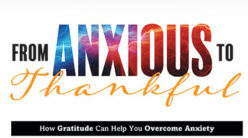Unemployment. Foreclosure. Recession. Bankruptcy. Credit crunch. Stock loss. Depression. Bank failure. In recent months, the negative reports about the economy have poured down on us like a torrential downpour. And when we’re drowning financially, it affects all aspects of life, including our health and relationships.
Millions of Americans feel anxious about current financial uncertainties. Fortunately, no matter your circumstances, it is possible to find your bearings financially. There’s hope, and it starts with reexamining your attitudes and values about financial security and success.
Consider these seven strategies that will help you come out of a recession with a healthier mind, body, spirit—and wallet.
1. Don’t panic.
Easier said than done, I know. Especially if you’ve lost your job and find yourself in the ranks of the nation’s unemployed. But remember, our grandparents lived through the troubling 1930s, and our parents survived a major war. We can live through this economic “hiccup.”
The surprising reality is that people who fear losing their job have more health problems than those who have actually lost their jobs. In a recent study conducted by the University of Michigan, 3,000 employed people under the age of 60 were researched for a 24-month period. The study found that those individuals who felt chronically insecure about their employment experienced more depression and overall health problems than the unemployed. Don’t let worry and panic make matters worse.
2. Take control.
In a clever test of stress control, researchers divided 100 office workers into two groups. While at their workstations, both groups in the experiment were bombarded with a variety of annoying sounds, including jackhammers and blaring music. One group was given the ability to press a red button to turn off the noise in their cubicles; the other group was not. Not surprisingly, the group with the red button had less stress than the group that was powerless. However, there was one surprising result: not one of the office workers who had a red button used it. Why? Because they knew they were in control. They knew they had a plan if they needed it.
Realize that you too can control your situation. Begin by reading a book, watching an informative DVD, or seeking advice from others who have experience and wisdom in the areas in which you feel a loss of control.
3. Change your perspective.
The majority of individuals still have their homes and jobs. Even in the Great Depression more than 75 percent of Americans were still employed. Today approximately 90 percent of Americans have jobs. We can shift our perspective and focus more on what is going right. In the past, for example, many of us had a long list of all the possessions and vacations we desired, but now we find ourselves simply grateful for our current employment.
Stop and think about the past, the obstacles you have overcome, and know that you will get through this current crisis. You can come out of this a more astute and prudent person in all aspects of life.
4. Increase your physical activity.
One of the best ways to reduce tension is to participate in a moderate exercise program. Rather than spend money every month on a local gym, why not simply walk a half hour every day? A brisk walk will increase endorphins, which reduce blue feelings, and will give you time to think about how you can reduce your ongoing household expenses.
5. Cultivate a balanced lifestyle.
Take the opportunity during financially challenging times to improve the quality of your overall lifestyle. Determine to consume plenty of fruits and vegetables every day, and develop the habit of drinking lots of pure water. Seven to eight hours of sleep are necessary for the synthesis of proteins, hormones, and enzymes, and when you feel stressed out by work or financial responsibilities, that sleep is more critical than ever.
6. Learn money management.
This is the time to discover the benefits of a household budget. If you don’t like the word “budget,” call it a “spending plan.” Discover the satisfaction of being thrifty. Instead of eating out, crack open one of those cookbooks in your kitchen and try a new recipe. Cut coupons, purchase produce that is on sale or seasonally inexpensive, and never purchase clothing unless it is on sale. Reduce your utility bills by planting shade trees, using energy-efficient lightbulbs, increasing insulation, and switching off the air conditioner when it is unnecessary.
Debt is definitely a no-no in today’s money-management predicament. Before you buy anything, ask yourself the hard questions: “Will anything terrible happen to me if I don’t purchase this item today?” “Is this a real necessity or just a want?” Cut up unnecessary credit cards, and strive to pay off your credit cards in full every month. In other words, change the way you manage your finances, and it will bring untold benefits to your health and relationships.
7. Choose community instead of materialism.
One way we can help fix the current financial meltdown is to recognize that possessing more material things will not make us happy. In my financial seminars I often point out that though the richest people in the world may have many mansions, numerous luxury automobiles, and an endless supply of the best cuisine, they can still only sleep in one bed at a time, drive one vehicle at a time, and eat one meal at a time.
Rather than obsessing about things, we can be enjoying family and friends, spending time with our children and grandkids, and giving back to society through acts of volunteerism. In a recent survey about what people consider the measure of success and a high quality of life, the top answers had nothing to do with money. The number one answer was “spending quality time with family” (88 percent), followed closely by “having a good relationship with your spouse or partner” (86 percent). In addition, volunteerism in many nonprofit organizations is up by 25 to 35 percent in the first quarter of this year. Use whatever dollars or time you can spare to enhance your connection to those you love.
Good News About a Bad Economy
Even when the economy is in bad shape, your life and health don’t have to be. It may surprise you that a seemingly bad economy can actually be good for your health. The United States death rates dropped during the 1972 and 1982 recessions and rose during the economic recovery that followed. This pattern happens because during a robust economy, people tend to work longer and spend less time on relationships and lifestyle; whereas in economic downturns we tend to take better care of our health and spend more time with families and friends. The bottom line: if you take steps toward financial health, even this recession can be a positive experience for you.?






